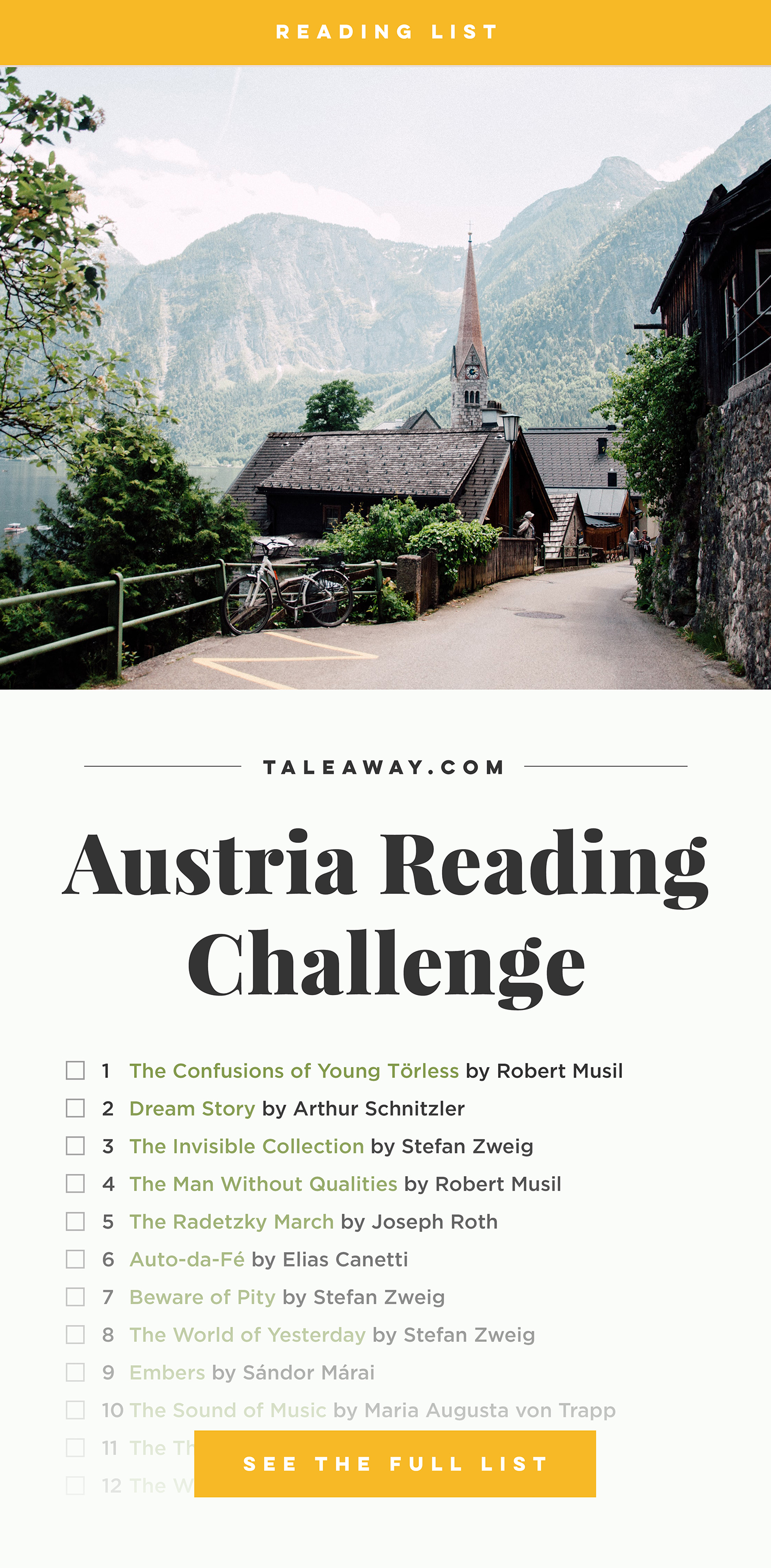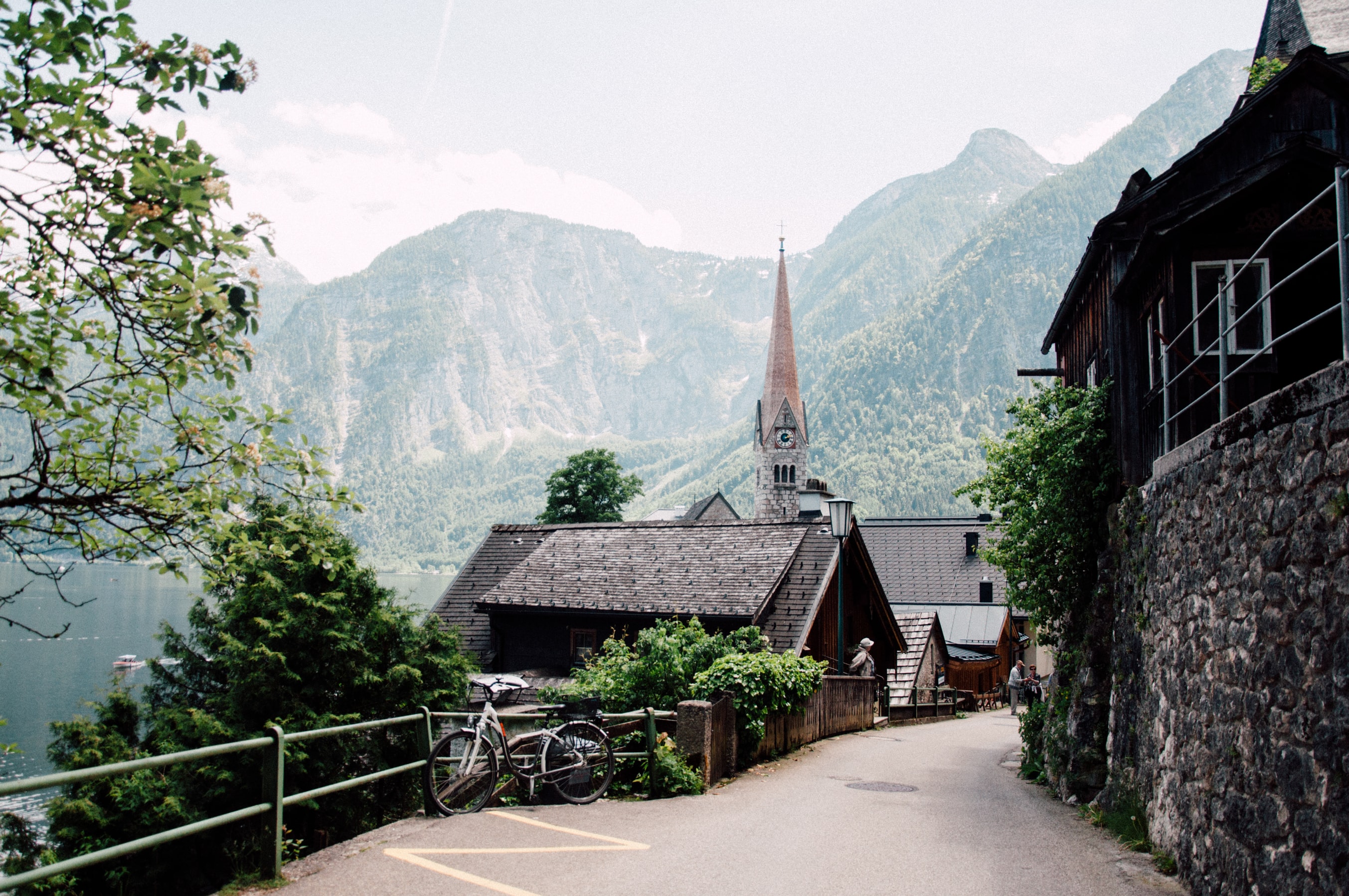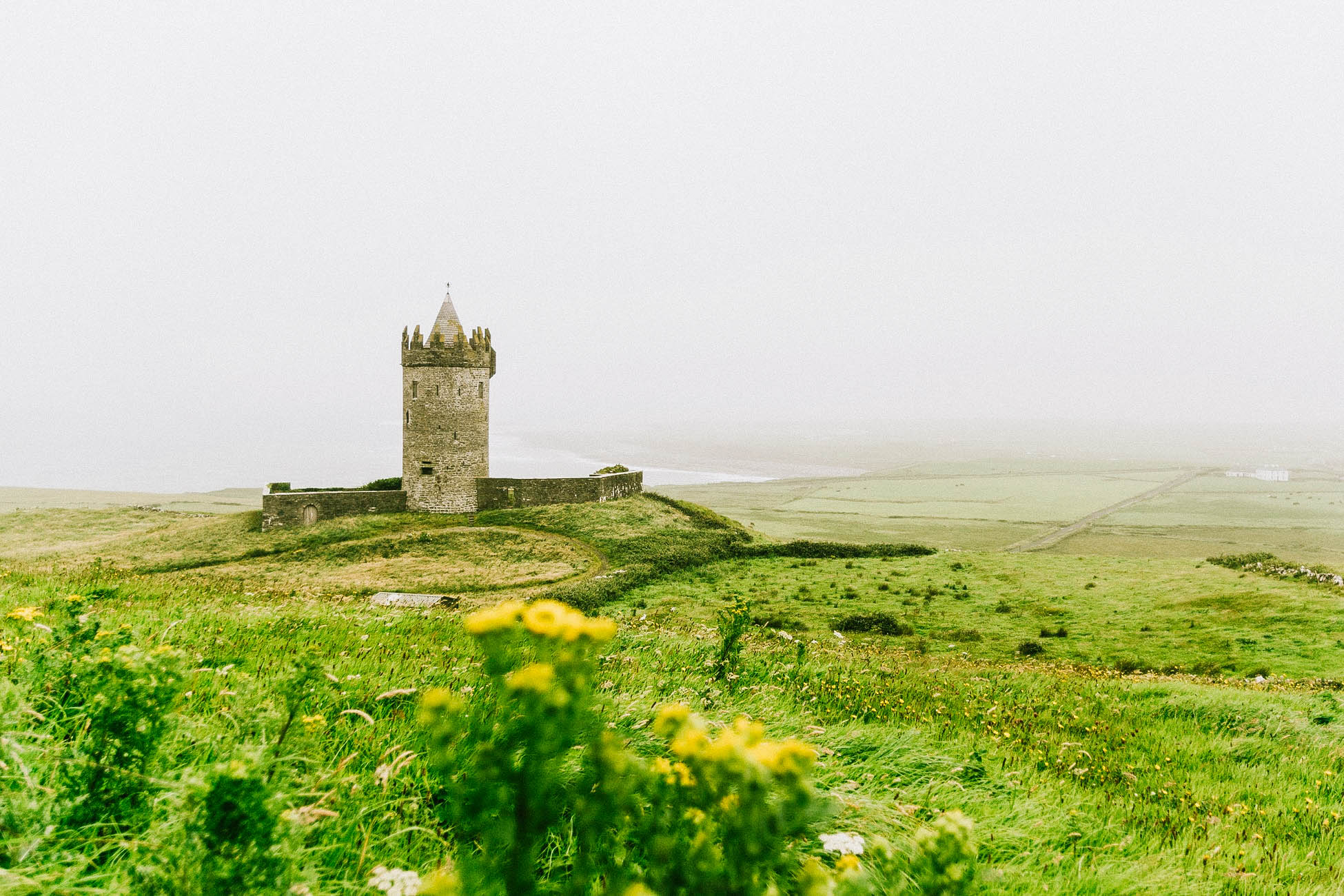Austria has a special place in my heart. I spent my first holiday away from my homeland there. A dear friend and her family welcomed me into their home in the countryside, generously sharing their traditions, cuisine and culture. We wandered the capital of Vienna, exploring the beautiful architecture, iconic coffeehouses and incredible Christmas markets. I loved every moment and this list of books set in Austria is an ode to this very special place. 🇦🇹
Please note: This post contains affiliate links. For more information, see my disclosures here.
Books Set In Austria: Overview
This collection of literature is sweeping, ranging from classics through to contemporary fiction. This list of books set in Austria includes works from two winners of the Nobel Prize for Literature; Elias Canetti and Elfriede Jelinek. Many other notable authors feature prominently too; such as Stefan Zweig, Peter Handke, Thomas Bernhard and Eva Ibbotson.
One of my favorite books set in Austria is The Third Man by Graham Greene, a spy classic inspired by the film of the same name (which I also recommend!) Alternatively, my most recent read was very different. The Piano Teacher by Elfriede Jelinek was a rather provocative, dark and disturbing tale; which I’m still not sure how I feel about.
Also, if you’re planning a visit to Vienna and would like a locals recommendations, my friend Carly is the expat and expert behind the blog Austrian Adaptation. Check it out for some hidden gems! 💎
Books Set In Austria: The Shortlist
If you’re short on time, here are some notable picks from the much longer list below:
- The Radetzky March by Joseph Roth
- The World of Yesterday by Stefan Zweig
- The Third Man by Graham Greene
- When Nietzsche Wept: A Novel of Obsession by Irvin D. Yalom
- The Piano Teacher by Elfriede Jelinek
- The Painted Kiss by Elizabeth Hickey
Want two of these Books Set in Austria for free?
- Try Amazon Audible free for 30 days and get 2 free audiobooks which you can play on loads of devices. Ideal for listening while gazing out the window. Best of all, you can cancel at any time and you can keep your books forever!
Books Set In Austria
1. The Confusions of Young Törless by Robert Musil, 1906
Like his contemporary and rival Sigmund Freud, Robert Musil boldly explored the dark, irrational undercurrents of humanity. The Confusions of Young Törless, published in 1906 while he was a student, uncovers the bullying, snobbery, and vicious homoerotic violence at an elite boys academy.
See reviews
2. Dream Story by Arthur Schnitzler, 1926
This wonderful translation of Dream Story will allow a fresh generation of readers to enjoy this beautiful, heartless and baffling novella. Dream Story tells how through a simple sexual admission a husband and wife are driven apart into rival worlds of erotic intrigue and revenge.
See reviews
3. The Invisible Collection (Buchmendel) by Stefan Zweig, 1929
The first of these two Stefan Zweig tales, The Invisible Collection, is about a blind collector of rare prints who does not realize that his priceless Durers and Rembrandts have been sold by his family and replaced by blank sheets of paper. The second is the touching tale of Buchmendel, an old bookdealer who is himself a universal catalogue, entirely devoted to his trade.
See reviews
4. The Man Without Qualities by Robert Musil, 1930
Set in Vienna on the eve of World War I, this great novel of ideas tells the story of Ulrich, ex-soldier and scientist, seducer and skeptic, who finds himself drafted into the grandiose plans for the 70th jubilee of the Emperor Franz Josef.
See reviews
5. The Radetzky March by Joseph Roth, 1932
The Radetzky March, Joseph Roth’s classic saga of the privileged von Trotta family, encompasses the entire social fabric of the Austro-Hungarian Empire just before World War I. The author’s greatest achievement, it is an unparalleled portrait of a civilization in decline, and as such, a universal story for our times.
See reviews
6. Auto-da-Fé by Elias Canetti, 1935
Auto-da-Fé is the story of Peter Kien, a distinguished, reclusive sinologist living in Vienna between the wars. With masterly precision, Canetti reveals Kien’s character, displaying the flawed personal relationships which ultimately lead to his destruction.
See reviews
7. Beware of Pity by Stefan Zweig, 1939
In 1913, a young second lieutenant discovers the terrible dangers of pity. He had no idea the girl was lame when he asked her to dance – his compensatory afternoon calls relieve his guilt but give her a dangerous glimmer of hope. Stefan Zweig’s only novel is a devastatingly unindulgent portrayal of the torment of the betrayal of both honor and love, realized against the background of the disintegration of the Austro-Hungarian empire.
See reviews
8. The World of Yesterday by Stefan Zweig, 1941
Stefan Zweig’s memoir, The World of Yesterday, recalls the golden age of prewar Europe – its seeming permanence, its promise and its devastating fall with the onset of two world wars. Zweig’s passionate, evocative prose paints a stunning portrait of an era that danced brilliantly on the brink of extinction.
See reviews
9. Embers by Sándor Márai, 1942
In a secluded woodland castle an old General prepares to receive a rare visitor, a man who was once his closest friend but who he has not seen in forty-one years. Over the ensuing hours host and guest will fight a duel of words and silences, accusations and evasions. They will exhume the memory of their friendship and that of the General’s beautiful, long-dead wife. Note: this one is set in the Austro-Hungarian Empire, and so appears on multiple of our reading lists!
See reviews
10. The Sound of Music: The Touching, Romantic Story of the Trapp Family Singers by Maria Augusta von Trapp, 1949
The Sound of Music, based on the lives of Maria, the baron, and their singing children, is as familiar to most of us as our own family history. But much about the real-life woman and her family was left untold. Here, Baroness Maria Augusta Trapp tells in her own beautiful, simple words the extraordinary story of her romance with the baron, their escape from Nazi-occupied Austria, and their life in America.
See reviews
11. The Third Man by Graham Greene, 1949
Rollo Martins’ usual line is the writing of cheap paperback Westerns under the name of Buck Dexter. But when his old friend Harry Lime invites him to Vienna, he jumps at the chance. With exactly five pounds in his pocket, he arrives only just in time to make it to his friend’s funeral. The victim of an apparently banal street accident, the late Mr. Lime, it seems, had been the focus of a criminal investigation, suspected of nothing less than being “the worst racketeer who ever made a dirty living in this city.” Martins is determined to clear his friend’s name, and begins an investigation of his own.
See reviews
12. The Wall by Marlen Haushofer, 1963
The Wall chronicles the life of the last surviving human on earth, an ordinary middle-aged woman who awakens one morning to find that everyone else has vanished. Assuming her isolation to be the result of a military experiment gone awry, she begins the terrifying work of survival and self-renewal. This novel is at once a simple and moving tale and a disturbing meditation on humanity.
See reviews
13. Airs Above the Ground by Mary Stewart, 1965
Lovely Vanessa March did not think it was a strange for her husband to take a business trip to Stockholm. What was strange was the silence that followed. Then she caught a glimpse of him in a newsreel shot of a crowd near a mysterious circus fire in Vienna and knew it was more than strange. It was downright sinister.
See reviews
14. Night Falls on the City (Vienna Trilogy #1) by Sarah Gainham, 1967
Beautiful actress Julia Homburg and her politician husband Franz Wedeker embody all the enlightened brilliance of pre-war Vienna. But Franz is Jewish, and just across the border the tanks of the Nazi Reich are primed for the Anschluss. Soon after the German troops enter Austria, disappearances become routine and Franz must be concealed.
See reviews
15. Setting Free the Bears by John Irving, 1968
It is 1967 and two Viennese university students want to liberate the Vienna Zoo, as was done after World War II. But their good intentions have both comic and gruesome consequences, in this first novel written by a twenty-five year old John Irving, already a master storyteller.
See reviews
16. The Goalie’s Anxiety at the Penalty Kick by Peter Handke, 1970
The self-destruction of a soccer goalie turned construction worker who wanders aimlessly around a stifling Austrian border town after pursuing and then murdering, almost unthinkingly, a female movie cashier is mirrored by his use of direct, sometimes fractured prose that conveys “at its best a seamless blend of lyricism and horror seen in the runes of a disintegrating world” (Bill Marx, Boston Sunday Globe).
See reviews
17. Malina by Ingeborg Bachmann, 1971
Bachmann tells the story of lives painfully intertwined: the unnamed narrator, haunted by nightmarish memories of her father, lives with the androgynous Malina, an initially remote and dispassionate man who ultimately becomes an ominous influence. Plunging toward its riveting finale, Malina brutally lays bare the struggle for love and the limits of discourse between women and men.
See reviews
18. A Sorrow Beyond Dreams by Peter Handke, 1972
Peter Handke’s mother was an invisible woman. Throughout her life, which spanned the Nazi era, the war, and the postwar consumer economy, she struggled to maintain appearances, only to arrive at a terrible recognition: “I’m not human any more.” Not long after, she killed herself with an overdose of sleeping pills. In A Sorrow Beyond Dreams her son sits down to record what he knows, or thinks he knows, about his mother’s life and death.
See reviews
19. The Seven-Percent Solution by Nicholas Meyer, 1974
First discovered and then painstakingly edited and annotated by Nicholas Meyer, The Seven-Per-Cent Solution relates the astounding and previously unknown collaboration of Sigmund Freud with Sherlock Holmes, as recorded by Holmes’s friend and chronicler, Dr. John H. Watson. It is a breathtaking account of their collaboration on a case of diabolic conspiracy in which the lives of millions hang in the balance.
See reviews
20. Correction by Thomas Bernhard, 1975
The scientist Roithamer has dedicated the last six years of his life to “the Cone,” an edifice of mathematically exact construction that he has erected in the center of his family’s estate in honor of his beloved sister. Not long after its completion, he takes his own life. As an unnamed friend pieces together—literally, from thousands of slips of papers and one troubling manuscript—the puzzle of Rotheimer’s breakdown, what emerges is the story of a genius ceaselessly compelled to correct and refine his perceptions until the only logical conclusion is the negation of his own soul.
See reviews
21. A Time of Gifts (Trilogy #1) by Patrick Leigh Fermor, 1977
In 1933, at the age of 18, Patrick Leigh Fermor set out on an extraordinary journey by foot – from the Hook of Holland to Constantinople. A Time of Gifts is the first volume in a trilogy recounting the trip, and takes the reader with him as far as Hungary.
See reviews
22. The World According to Garp by John Irving, 1978
This is the life and times of T. S. Garp, the bastard son of Jenny Fields – a feminist leader ahead of her times. This is the life and death of a famous mother and her almost-famous son; theirs is a world of sexual extremes – even of sexual assassinations. It is a novel rich with “lunacy and sorrow”; yet the dark, violent events of the story do not undermine a comedy both ribald and robust.
See reviews
23. The Hotel New Hampshire by John Irving, 1981
“The first of my father’s illusions was that bears could survive the life lived by human beings, and the second was that human beings could survive a life led in hotels.” So says John Berry, son of a hapless dreamer, brother to a cadre of eccentric siblings, and chronicler of the lives lived, the loves experienced, the deaths met, and the myriad strange and wonderful times encountered by the family Berry. Note: this is set between New Hampshire, New York and Vienna.
See reviews
24. The Post Office Girl by Stefan Zweig, 1982
It’s the 1930s. Christine, A young Austrian woman whose family has been impoverished by the war, toils away in a provincial post office. Out of the blue, a telegram arrives from an American aunt she’s never known, inviting her to spend two weeks in a Grand Hotel in a fashionable Swiss resort. She accepts and is swept up into a world of almost inconceivable wealth and unleashed desire, where she allows herself to be utterly transformed. Then, just as abruptly, her aunt cuts her loose and she has to return to the post office, where – yes – nothing will ever be the same.
See reviews
25. Wittgenstein’s Nephew by Thomas Bernhard, 1982
It is 1967. In separate wings of a Viennese hospital, two men lie bedridden. The narrator, Thomas Bernhard, is stricken with a lung ailment; his friend Paul, nephew of the celebrated philosopher Ludwig Wittgenstein, is suffering from one of his periodic bouts of madness. As their once-casual friendship quickens, these two eccentric men begin to discover in each other a possible antidote to their feelings of hopelessness & mortality—a spiritual symmetry forged by their shared passion for music, strange sense of humor, disgust for bourgeois Vienna & fear in the face of death.
See reviews
26. Magic Flutes (The Reluctant Heiress) by Eva Ibbotson, 1982
Spring, 1922. Tessa is a beautiful, tiny, dark-eyed princess – who’s given up her duties to follow her heart, working for nothing backstage at the Viennese opera. No one there knows who she really is, or that a fairy-tale castle is missing its princess, and Tessa is determined to keep it that way. But secret lives can be complicated, and when a wealthy, handsome Englishman discovers this bewitching urchin backstage, Tessa’s two lives collide – and in escaping her inheritance, she finds her destiny.
See reviews
27. The Loser by Thomas Bernhard, 1983
One of Bernhard’s most acclaimed novels, The Loser centers on a fictional relationship between piano virtuoso Glenn Gould and two of his fellow students who feel compelled to renounce their musical ambitions in the face of Gould’s incomparable genius. One commits suicide, while the other – the obsessive, witty, and self-mocking narrator – has retreated into obscurity. Written as a monologue in one remarkable unbroken paragraph, The Loser is a brilliant meditation on success, failure, genius, and fame.
See reviews
28. Old Masters: A Comedy by Thomas Bernhard, 1985
The book is set in Vienna on one day around the year of its publication, 1985. Reger is an 82-year-old music critic who writes pieces for The Times. For over thirty years he has sat on the same bench in front of Tintoretto’s White-Bearded Man in the Bordone Room of the Kunsthistorisches Museum for four or five hours of the morning of every second day. He finds this environment the one in which he can do his best thinking. He is aided in this habit by the gallery attendant Irrsigler, who prevents other visitors from using the bench when Reger requires it.
See reviews
29. Brother of Sleep by Robert Schneider, 1992
Could the greatest musician of all time live his life in a remote peasant village and never be discovered by the world? Set against the backdrop of an Alpine village in the nineteenth century, this astounding novel tells the story of Elias Johannes Alder, a musical genius with supernatural hearing who develops his talent in secret midnight sessions at the church organ.
See reviews
30. When Nietzsche Wept: A Novel of Obsession by Irvin D. Yalom, 1992
Friedrich Nietzsche, Europe’s greatest philosopher. Josef Breuer, one of the founding fathers of psychoanalysis. A secret pact. A young medical intern named Sigmund Freud. These are the elements that combine to create the unforgettable saga of an imagined relationship between an extraordinary patient and a gifted healer.
See reviews
31. The Morning Gift by Eva Ibbotson, 1993
Ruth lives in the beautiful city of Vienna and is wildly in love with Heini Radik, a brilliant young pianist. But her world is about to change forever. When Hitler’s forces invade Ruth’s family flees to London, but she is unable to get a passport. Quin, a young professor and friend of the family, visits Ruth and in an effort to bring her back to London, he offers a marriage of convenience. As Ruth throws herself into her London life, Quin begins to fall desperately in love with her.
See reviews
32. A Song for Summer by Eva Ibbotson, 1997
Ellen never expected the Hallendorf school to be quite so unusual. Her life back in England with her suffragette mother and liberated aunts certainly couldn’t be called normal, but buried deep in the beautiful Austrian countryside, Ellen discovers an eccentric world occupied by wild children and even wilder teachers, experimental dancers and a tortoise on wheels.
See reviews
33. An Equal Music by Vikram Seth, 1999
Michael Holme is a violinist, a member of the successful Maggiore Quartet. He has long been haunted, though, by memories of the pianist he loved and left ten years earlier, Julia McNicholl. Now Julia, married and the mother of a small child, unexpectedly reenters his life and the romance flares up once more. Against the magical backdrop of Venice and Vienna, the two lovers confront the truth about themselves and their love, about the music that both unites and divides them, and about a devastating secret that Julia must finally reveal.
See reviews
34. The Star of Kazan by Eva Ibbotson, 1999
Annika has never had a birthday. Instead she celebrates her Found Day, the day a housemaid and a cook to three eccentric Viennese professors found her and took her home. There, Annika has made a happy life in the servants’ quarters, surrounded with friends, including the elderly woman next door who regales Annika with stories of her performing days and her countless admirers – especially the Russian count who gave her the legendary emerald, the Star of Kazan.
See reviews
35. The Fig Eater by Jody Shields, 2000
When a young woman’s body is discovered in the summer of 1910 Vienna, the Inspector’s wife is certain the figs found in her stomach during the autopsy are the clue to the identity of the murderer – for there are no fresh figs in Vienna at this time of year.
See reviews
36. A Death in Vienna (Gabriel Allon #4) by Daniel Silva, 2003
Art restorer and sometime spy Gabriel Allon is sent to Vienna to discover the truth behind a bombing that gravely injured an old friend, but while there he encounters something that turns his world upside down. It is a face – a face that feels hauntingly familiar, a face that chills him to the bone.
See reviews
37. The Piano Teacher by Elfriede Jelinek, 2004
Erika Kohut is a piano teacher at the prestigious and formal Vienna Conservatory, who still lives with her domineering and possessive mother. Her life appears to be a seamless tissue of boredom, but Erika, a quiet thirty-eight-year-old, secretly visits Turkish peep shows at night to watch live sex shows and sadomasochistic films. Meanwhile, a handsome, self-absorbed, seventeen-year-old student has become enamored with Erika and sets out to seduce her.
See reviews
38. Marrying Mozart by Stephanie Cowell, 2004
Amadeus meets Little Women in this irresistibly delightful historical novel by award-winning author Stephanie Cowell. The year is 1777 and the four Weber sisters, daughters of a musical family, share a crowded, artistic life in a ramshackle house. While their father scrapes by as a music copyist and their mother secretly draws up a list of prospective suitors in the kitchen, the sisters struggle with their futures, both marital and musical – until twenty-one-year-old Wolfgang Mozart walks into their lives.
See reviews
39. The Painted Kiss by Elizabeth Hickey, 2005
Vienna in 1886 was a city of elegant cafés, grand opera houses, and a thriving and adventurous artistic community. It is here where the twelve-year-old Emilie meets the controversial libertine and painter. Hired by her bourgeois father for basic drawing lessons, Klimt introduces Emilie to a subculture of dissolute artists, wanton models, and decadent patrons that both terrifies and inspires her.
See reviews
40. Mortal Mischief by Frank Tallis, 2005
In 1900s Vienna, Psychoanalyst Dr Max Liebermann is called in to help with police investigations into the murder of a young medium. In this first of a new series of psychoanalytical detective novels set in Vienna, Dr Max Liebermann is a young psychoanalyst – and disciple of Freud. The world of 1900s Vienna is one where philosophy, science and art flourish and are hotly debated in the coffee shops. Psychoanalysis is still developing and is viewed with a mixture of excitement and suspicion.
See reviews
41. Love Virtually by Daniel Glattauer, 2006
‘Write to me, Emmi. Writing is like kissing, but without lips. Writing is kissing with the mind.’ It begins by chance: Leo receives emails in error from an unknown woman called Emmi. Being polite he replies, and Emmi writes back. A few brief exchanges are all it takes to spark a mutual interest in each other, and soon Emmi and Leo are sharing their innermost secrets and longings. The erotic tension simmers, and it seems only a matter of time before they will meet in person.
See reviews
42. The Elephant’s Journey by José Saramago, 2008
In 1551, King João III of Portugal gave Archduke Maximilian an unusual wedding present: an elephant named Solomon. The elephant’s journey from Lisbon to Vienna was witnessed and remarked upon by scholars, historians, and ordinary people. Out of this material, José Saramago has spun a novel already heralded as “a triumph of language, imagination, and humor”.
See reviews
43. The Empty Mirror (Viennese Mysteries #1) by J. Sydney Jones, 2008
The summer of 1898 finds Austria terrorized by a killer who the press calls Vienna’s Jack the Ripper. Four bodies have already been found, but when the painter Gustav Klimt’s female model becomes the fifth victim, the police finger him as the culprit. The artist has already scandalized Viennese society with his erotically charged modern paintings. Who better to take the blame for the crimes that have plagued the city?
See reviews
44. Leviathan (Leviathan #1) by Scott Westerfeld, 2009
Prince Aleksander, would-be heir to the Austro-Hungarian throne, is on the run. His own people have turned on him. His title is worthless. All he has is a battletorn war machine and a loyal crew of men. Deryn Sharp is a commoner, disguised as a boy in the British Air Service. She’s a brilliant airman. But her secret is in constant danger of being discovered. With World War I brewing, Alek and Deryn’s paths cross in the most unexpected way… taking them on a fantastical, around-the-world adventure that will change both their lives forever.
See reviews
45. The Hare With Amber Eyes: A Family’s Century of Art and Loss by Edmund de Waal, 2009
The Ephrussis were a grand banking family, as rich and respected as the Rothschilds, who “burned like a comet” in nineteenth-century Paris and Vienna society. Yet by the end of World War II, almost the only thing remaining of their vast empire was a collection of 264 wood and ivory carvings, none of them larger than a matchbox. The renowned ceramicist Edmund de Waal became the fifth generation to inherit this small and exquisite collection of netsuke. Entranced by their beauty and mystery, he determined to trace the story of his family through the story of the collection.
See reviews
46. Becoming Marie Antoinette (Marie Antoinette #1) by Juliet Grey, 2011
This enthralling confection of a novel, the first in a trilogy, follows the transformation of a coddled Austrian archduchess into the reckless, powerful, beautiful queen Marie Antoinette.
See reviews
47. Waiting for Sunrise by William Boyd, 2012
Vienna. 1913. It is a fine day in August when Lysander Rief, a young English actor, walks through the city to his first appointment with the eminent psychiatrist, Dr. Bensimon. Sitting in the waiting room he is anxiously pondering the nature of his problem when an extraordinary woman enters. She is clearly in distress, but Lysander is immediately drawn to her strange, hazel eyes and her unusual, intense beauty.
See reviews
48. The Tobacconist by Robert Seethaler, 2012
When seventeen-year-old Franz exchanges his home in the idyllic beauty of the Austrian lake district for the bustle of Vienna, his homesickness quickly dissolves amidst the thrum of the city. In his role as apprentice to the elderly tobacconist Otto Trsnyek, he will soon be supplying the great and good of Vienna with their newspapers and cigarettes. Among the regulars is a Professor Freud, whose predilection for cigars and occasional willingness to dispense romantic advice will forge a bond between him and young Franz.
See reviews
49. The Exiles Return by Elisabeth de Waal, 2013
The Exiles Return is set in Occupied Vienna in 1954-5. It describes five people who grew up there before the war and have come back to see if they can re-establish the life they have lost. The novel begins with Professor Kuno Adler, who is Jewish and fled Vienna after the Anschluss (the events of March 1938 when Hitler’s troops marched into Austria). He is returning from New York to try and take up his old life as a research scientist. We realise through his confrontation with officialdom and with the changed fabric of the city, that a refugee who goes back has a very difficult time.
See reviews
50. The English Girl by Margaret Leroy, 2013
When seventeen-year-old Stella Whittaker is offered the chance to study at the Academy of Music and Performing Arts in Vienna it’s a dream-come-true, made possible by old family friends, Rainer and Marthe Kraus, who offer her a room in their apartment. Seduced by the elegant beauty of the city, Stella explores the magnificent palaces, gardens and fashionable coffee houses, and after a chance meeting in an art gallery, falls in love with Harri Reznik, a young Jewish doctor.
See reviews
51. Freud’s Mistress by Karen Mack, 2013
Minna Bernays is an overeducated woman with limited options. Fired yet again for speaking her mind, she finds herself out on the street and out of options. In 1895 Vienna, even though the city is aswirl with avant-garde artists and writers and revolutionary, there are still very few options for women besides marriage. And settling is not something Minna has ever done.
See reviews
52. A Woman of Note by Carol M. Cram, 2015
Virtuoso pianist Isabette Grüber captivates audiences in the salons and concert halls of early nineteenth-century Vienna. Yet in a profession dominated by men, Isabette longs to compose and play her own music – a secret she keeps from both her lascivious manager and her resentful mother. She meets and loves Amelia Mason, a dazzling American singer with her own secrets, and Josef Hauser, an ambitious young composer. But even they cannot fully comprehend the depths of Isabette’s talent.
See reviews
53. The Accidental Empress (Sisi #1) by Allison Pataki, 2015
The year is 1853, and the Habsburgs are Europe’s most powerful ruling family. With his empire stretching from Austria to Russia, from Germany to Italy, Emperor Franz Joseph is young, rich, and ready to marry. Fifteen-year-old Elisabeth, “Sisi,” Duchess of Bavaria, travels to the Habsburg Court with her older sister, who is betrothed to the young emperor. But shortly after her arrival at court, Sisi finds herself in an unexpected dilemma: she has inadvertently fallen for and won the heart of her sister’s groom.
See reviews
54. The Lost Letter by Jillian Cantor, 2017
Austria, 1938. Kristoff is a young apprentice to a master Jewish stamp engraver. When his teacher disappears during Kristallnacht, Kristoff is forced to engrave stamps for the Germans, and simultaneously works alongside Elena, his beloved teacher’s fiery daughter, and with the Austrian resistance to send underground messages and forge papers. As he falls for Elena amidst the brutal chaos of war, Kristoff must find a way to save her, and himself.
See reviews
What do you think of these books set in Austria?
Do you call Austria home? Have any travel tips for readers visiting? Have some great books set in Austria to recommend? Are you visiting Austria soon? I’d love to hear about more about your tips for books set in Austria in the comments below!
Looking for more reading ideas?
If you’re looking for more books set around Europe, see some of these popular posts:
- Books Set in France: French Novels
- Books Set in Germany: German Novels
- Books Set in Spain: Spanish Novels
- Books Set in Scandinavia: Scandinavian Books
- Books Set in Scotland: Scottish Novels
Special Offers from Tale Away
These are just a few things I love using for reading and travel, which have special deals that I want to pass on to you! 🙌
- Try Amazon Prime free for 30 days and get access to the Prime Reading library and free shipping on thousands of books. This was responsible for a significant increase in my home library!
- Receive free AirBNB travel credit when you sign up for a new account. I love staying at AirBNB’s for an authentic and local experience when traveling.
- Try Amazon Audible free for 30 days and get 2 free audiobooks which you can play on loads of devices. Ideal for listening while gazing out the window. Best of all, you can cancel at any time and you can keep your books forever!

































































8 comments
My favourite book set in Austria is A Whole Life by Robert Seethaler and The Camera Killer by Thomas Glavinic, both amazing novels. The Wall by Marlen Haushofer doesn’t say it is set in Austria but feels as if it is and is a thoroughly engrossing read too.
Wow! Thanks so much for sharing these amazing recommendations Carol! 🙂
I loved A Whole Life by Robert Seethaler too, and read it while on holiday in Austria several years ago. I also really enjoyed The Tobacconist by the same author.
We’re planning a return trip to Austria this year and as well as brushing up my German, I’m looking forward to reading The Radesky March by Joseph Roth, then choosing more titles from this wonderful selection.
Thank you very much, Ash, for setting up this website, and to the others who have posted suggested titles for us : )
Hi Jean! Thanks so much for your kind words, it means the world. I hope you had an amazing trip to Austria and that you found some incredible reads to accompany your travels!
I was delighted to see you have quite a few books by Eva Ibbotson, but I did not see my favorite of hers, which I love for its vivid evocation of pre-WWI Vienna: “Madensky Square“. I highly recommend it.
Hi Lucinda! Thanks so much for sharing this recommendation, I hadn’t heard of of this title before!
Your list is wonderful, Ash! As are Carol’s recommendation.
My favourite Austrian crime author is called Marie Anders. What I love the most about her books is that they are all set in the gorgeous city of Salzburg. Reading her books makes you feel as if you are walking down the streets and solving crime yourself. So far she has published four books in German (Pralinen des Todes, Die Finnische Socke, Tod im Grünen Klee, and Mord im Dos Santos). Her first two books have already been translated into English and can be found under the titles of “Death by Truffles” and “The Finnish Sock”.
Thanks so much for your kind words Steph, and for your amazing recommendations too!